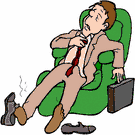Exhaustion Promotes Weight Gain
Friday, July 11, 2008 OK, we know stress, lack of time, low socioeconomic status, poor locus of control and poor sleep promote obesity – but here is a new one (at least for me): Vital Exhaustion.
OK, we know stress, lack of time, low socioeconomic status, poor locus of control and poor sleep promote obesity – but here is a new one (at least for me): Vital Exhaustion.
The term Vital Exhaustion (VE) has three defining characteristics: (1) feelings of excessive fatigue and lack of energy, (2) increasing irritability, and (3) feelings of demoralization.
People often attribute these feelings to overwork, or to problems at work or in other important life areas that the person has not been able to solve, or to a real or symbolic loss. Therefore, it has been suggested that VE is a mental state at which people arrive when their resources for adapting to stress are broken down.
Now Maria Bryant and colleagues from the University of Leeds, UK in a paper just out in OBESITY, examined the relationship between VE and BMI cross-sectionally and after 3 and 6 years of follow-up among the 13,727 participants in the Atherosclerosis Risk in Communities (ARIC) study.
BMI was significantly higher among both white and African-American men and women in the highest VE quartile compared to those with no VE. Similarly, high VE at baseline was associated with higher BMI 3 and 6 years later. Baseline VE predicted future excess weight gain in white men and women, but not in African Americans.
Clearly, if this relationship is causal, identifying the factors contributing to VE and addressing them may help prevent and reduce the burden of obesity – certainly easier said than done.
Anyone who thinks we will solve the obesity crisis by handing out diet plans and chasing people around the block are kidding themselves.
AMS
Edmonton, Alberta


